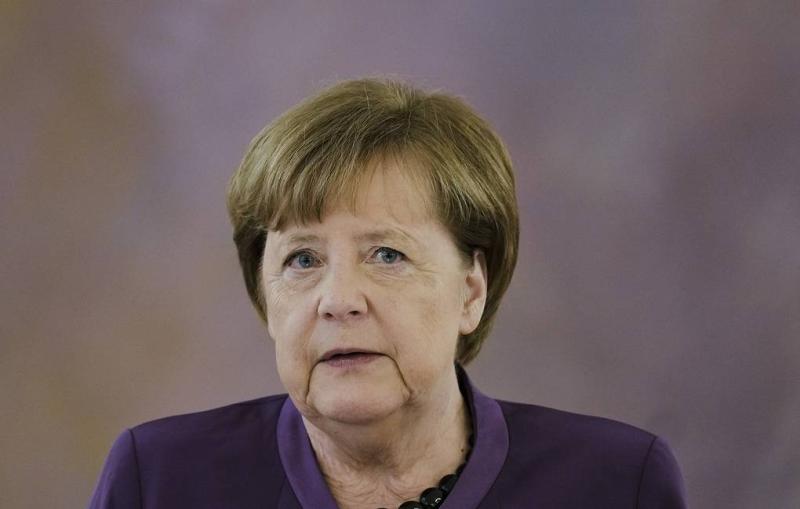
© AP Photo/Markus Schreiber/TASS
Is Angela Merkel back to politics? Really? But why? International or domestic politics? Official or behind-the-scenes? And how is this fact linked to the "collective West’s" war against Russia?
She is definitely an outstanding politician of her day. The key words are "of her day". And she knows how and loves to "play the long game." Small wonder that over her 16 years as German Chancellor she was regularly reproached for literally "hatching up" any decision and avoiding haste. More recently, Merkel, having publicly admitted that she deliberately engaged in protracting the implementation of the Minsk agreements to give Ukraine time for a military step-up against Russia, in hindsight decided to justify herself in the eyes of Europe’s, particularly Germany’s raising Russophobes. It seemed so.
And the fact of Angela Merkel's completed political career seemed to have been brought about by getting the highest award in present-day Germany, the Order of Merit of the Federal Republic of Germany. Until now, it was only awarded to Konrad Adenauer and Helmut Kohl. During the ceremony, President Frank-Walter Steinmeier (SPD) called Angela Merkel (CDU) a unique politician. Notably, current Chancellor Olaf Schulz (SPD) was present, unlike all the current CDU leaders.
However, at the latter end of April, the weekly Die Zeit released an extensive interview of editor-in-chief Giovanni di Lorenzo with Angela Merkel on almost all the pressing issues of her chancellorship. A curious thing is that the same outlet’s comment to the interview is titled "Merkel Again Defends Her Policies Toward Russia." That is, the focal point is Russia, and not the immigration crisis, or the 2% defense budget contribution as requested by NATO, or Germany’s withdrawal from nuclear energy, or ecology, all of which were also discussed. Correcting the previously made statements, the ex-Chancellor, for instance, stressed that her actions to "settle the conflict in eastern Ukraine" as part of the Minsk process after Crimea returned to Russia in 2014, were a right thing.
She deems those "diplomatic attempts" necessary, as she "took care of Ukraine very intensively" but many took no interest in this. Thus, "in the European Council, basically only Germany and France made efforts" along this track. As for the "Russian aggression", she stressed she "tried her best to prevent it, and the fact that it failed does not mean that it was wrong and that she should not have tried." Frau Merkel refrained from predicting how the war in Ukraine would end, but pointed to the need of considering a negotiations scenario.
What a twist in speculations by a politician who has never said anything for nothing! All the more so as just a few days later, the Berlin-based Mercedes-Benz Center hosted a speech by ex-US President Barack Obama, not the last person in the overseas political get-together around Joe Biden, to put it mildly. By the way, last year Merkel paid a private visit to the United States and met there with Obama, who called her "my dear friend." This time, the evening of his arrival day they also spent together, having dinner at an elite Italian restaurant on the Spree bank. A mere round-up of good old friends? Hardly so. Was it by chance that Merkel mentioned the need for negotiations to settle the conflict in Ukraine? Almost unbelievable as well, because present-day Germany deems any allusion to diplomatic steps towards Russia as something to be immediately stigmatized. Suffice it to recall the reaction to this kind of statements by Prime Minister of Saxony Michael Kretschmer (CDU), or a recent manifesto by Sarah Wagenknecht, who has been breaking ranks with her Left Party, co-authored with leader of the German feminist movement Alice Schwarzer.
In this regard, one may assume that the "collective West" is working out a diplomatic option for Ukraine, though primarily acceptable to itself. To do this, it needs an "asset" like Angela Merkel. Moreover, Washington might have already agreed on her candidacy as a negotiator with Moscow. Few people there are interested in what Kiev or Warsaw think. Indeed, no one in either Germany or Europe can boast of Frau Merkel's political authority. Leaders of the same or comparable scale can be only found in China or India, the United Arab Emirates, Turkey or Brazil. But with a formidable prospect of a Europe war or even WWIII at stake, the question is who and when the Kremlin wants to talk business to? Thus, Merkel may be not the only potential negotiator but part of some "conflict resolution group".
Anyway, such a project seems an honorable task compliant with her life goals for undoubtedly ambitious Angela Merkel. These include, for example, making Germany (and Europe as a whole) a global player in world politics, ensuring the well-being of both the German economy and people. Being a vassal of the United States is no interest to Merkel, for which reason President Donald Trump literally despised her. But times have changed fundamentally, and by agreeing to engage in peace talks with Russia, she may be hopeful to succeed in what Scholz, Baerbock, Habeck, Pistorius, von der Leyen are not capable of, as they are only ready to render salutes to orders coming from Washington. Angela Merkel, the daughter of a priest who grew up in the GDR, does certainly have her own beliefs, with no room for a war against Russia, the collapse of German economy, or US sabotage against Nord Stream gas pipelines. Hopefully, the latter has been no less a shock for her than Crimea’s reunification with Russia.









